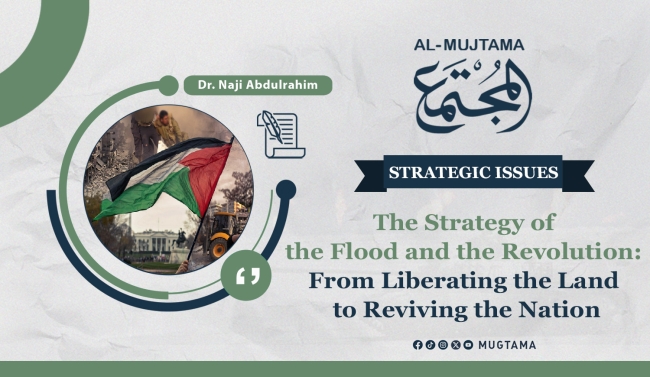The Strategy of the Flood and the Revolution: From Liberating the Land to Reviving the Nation
Revolutions are not fleeting moments that pass over the surface of time; they are earthquakes that shake the earth to reshape history. They are the labor pains that give birth to nations, and they are the hours that sow the seeds of dignity for the future. The revolution does not express a temporary anger or a fleeting strike; rather, it is an existential call that screams against injustice. It is the moment of redemption that redefines humanity and the meaning of being human, inscribing with blood on the pages of freedom the retrieval of a homeland. In this context, the flood comes not as a military confrontation or a political event, but as a comprehensive civilizational moment that has restored the compass of identity to the nation, bridging history and the future in a single tableau of struggle, which began in Palestine and will return to liberate Palestine.
Inference... At the Great Turning Point
When the first spark ignited in Palestine, the scene appeared as if the giant was waking from a long slumber; as if the nation, with heavy steps, began to shed the shackles of humiliation to reclaim its lost pride. The "Flood of Al-Aqsa" came as a crown for these uprisings, proclaiming that Palestine is not merely a local or even regional issue, but a global icon of dignity and resilience. Al-Aqsa, which has always represented more than just a mosque, became the focal point of a cosmic battle that embodies the struggle for identity. Here, in the heart of Gaza, the nation proved that true strength is not measured by the material power of weapons, but by the depth of faith in a just cause, where words and blood unite in a single epic.
Between History and the Future... Revolutions as Civilizational Crossings
History is merely a series of great transformations that have changed the course of humanity; therefore, revolutions are not just immediate movements, but bridges that connect eras. The French Revolution, which abolished the monarchy, marked the beginning of a new era of freedom and equality, while the Industrial Revolution shattered the constraints of traditional economics, heralding the age of modernity. In the Arab world, the first revolutions against occupation were a restoration of national dignity, which did not stop at political liberation, but transcended it toward building a society of rights, freedom, and justice. And despite the setbacks of the Arab Spring, the flame ignited in those squares has not been extinguished; rather, it has transformed into revolutionary waves waiting for a flood to elevate them and topple the tyrants and oppressors.
Al-Aqsa: A Qibla and a Cause for Liberation and Humanity
Thus, the flood is not merely a chapter in the book of the Palestinian Israeli conflict; it is a manifestation of a struggle for a deeper right. It is a battle for the restoration of the spirit and the revival of the values that have eroded under the weight of occupation and tyranny. Al-Aqsa Mosque is not just a sacred place, but a global symbol of justice and the rejection of oppression. From the flood to the revolution, peoples have united in a single cry declaring that liberation is not a distant dream, but a reality born from the womb of will.
Revolutions and the Deluge... A Duality of Liberation
The "Arab Spring" was like the rising of a new sun on the horizon of freedom; those revolutions, ignited by Tunisia and Egypt, announced that peoples are capable of breaking their chains. Then came the "Deluge of Al-Aqsa" to continue the journey, confirming that the liberation of Palestine is an inseparable part of the nation's struggle. The revolutions that called for dignity and freedom found in "Al-Aqsa" a unifying symbol that brings the nation together around a just cause that does not accept compromise.
Challenges and Transformations... The Levant, the Land of Resurrection and Rebirth
The Syrian revolution, with all its complex interconnections, was and still is a lesson in understanding the intertwining of directions, perspectives, and local and international interests. Despite this, the revolution has demonstrated that resisting internal tyranny cannot be achieved without confronting external interventions, through revolutionary participation in Syria and strategic coalitions in Lebanon. In this context, the "Deluge of Al-Aqsa" came to affirm that the struggle for freedom cannot be separated from the struggle for national liberation.
Egypt and Palestine... Unity of Destiny
Egypt is always the heart of the Arab nation. It has been and remains at the core of every movement striving to liberate Palestine. The Egyptian revolution was not merely a local movement; it was a cry aimed at reshaping the relationship between the people and the authority they chose through the ballot boxes. At every turn, Palestine remains Egypt's central cause, for liberating and restoring it are values, duties, and unwavering certainties.
In Summary... Towards a Revival of the Nation
The deluge is not just an uprising; it is the culmination of painful labor, where the cries of revolutions soar to inscribe the moment of the birth of a homeland—a moment that restores hope for a nation forcibly taken from the hands of this community and rearranges its priorities, challenging every hardship. This nation, which has stood firm amidst the storms of pain, is capable of rising anew, from the heart of "Al-Aqsa," where the spirit emerges to restore for the nation its identity and dignity, guiding it on a new path towards truth, freedom, and justice. In this place, the future is written with the blood of martyrs, bearing the title "A Nation Capable of Restoring its Homeland."


